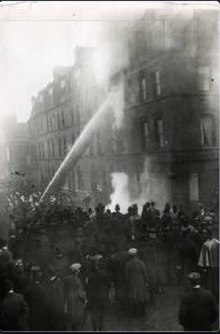| The Aerial Anarchists | |
|---|---|
 Screen shot Screen shot | |
| Directed by | Walter R. Booth |
| Produced by | Charles Urban |
| Distributed by | Kineto Film |
| Release date |
|
| Running time | 15 minutes |
| Country | United Kingdom |
| Languages | Silent film English intertitles |
The Aerial Anarchists is a 1911 British silent science fiction film directed by Walter R. Booth. It is the third and final film in Booth's science fiction series seeking to present a picture of futuristic aerial warfare. Aerial Anarchists followed on from Aerial Torpedo and Aerial Submarine and the films constitute the first real science fiction series made in the United Kingdom. The story focuses on an attack against London by a fleet of airships from an unknown country.
Plot
There is currently no known surviving footage of this film and all information is based upon the original catalog synopsis from Kineto Film Studios. The film contains scenes of a bombing and its aftermath throughout London. Sequences such as the bombing of St. Paul's Cathedral and a railway disaster in which a train is seen to leap into a chasm, feature prominently.
Production
Airships provide the "engine of destruction" in The Aerial Anarchists. The Kineto Film Catalogue describes the film as follows:
"This thrilling and amazing film depicts with far more realism than could be conveyed by the pen of the imaginative novelist, the horrors of warfare upon society if carried on by means of the latest development of mechanics - Aviation.
The picture is a series of thrills from beginning to end, but the most extraordinary and vivid incidents are the bombardment of St. Paul's Cathedral from an Aeroplane and a Railway Accident, in which a train leaps into a chasm.
These exciting scenes are so magnificent and realistically staged that they will fill audiences with amazement and mystification."
Reception
Aviation film historian Michael Paris in From the Wright Brothers to Top Gun: Aviation, Nationalism, and Popular Cinema (1995) described the connection of The Aerial Anarchists to the novels of Jules Verne. "Clearly the paradox that while the flying machine could be a powerful agent of civilization and progress, in the wrong hands, it could also be a terrifying engine of destruction which would change the whole nature of warfare."
See also
References
Notes
- Sources including www.silentsf.com posit that this film is based upon the Edward Douglas Fawcett novel, Hartmann the Anarchist.
Citations
- Staveley-Wadham, Rose (26 October 2020). "The British Newspaper Archive Blog Kinematograph Weekly | The British Newspaper Archive Blog". Retrieved 4 November 2024.
- Low 1973, p. 260.
- Shaw, Tony (20 November 2014). Cinematic Terror: A Global History of Terrorism on Film. Bloomsbury Publishing USA. ISBN 978-1-4411-5809-3.
- Hunter, Ian (25 July 2019). British Trash Cinema. Bloomsbury Publishing. ISBN 978-1-83871-485-7.
- Slide, Anthony (2003). The Encyclopedia of British Film. Methuen. ISBN 978-0-413-77301-2.
- ^ Joyce, Steve. "Essay: 'The Aerial Anarchists'." Silentsf.com, 26, July 2003. Retrieved: 11 June 2019.
- Lee 1973, p. 5.
- Paris 1995, p. 19.
- Paris 1995, p. 18.
Bibliography
- Lee, Walt. Reference Guide to Fantastic Films. London: Chelsea Lee Books, 1973. ISBN 978-0-91397-402-5.
- Low, Rachael. History of British Film: 1906-1914. London: Unwin Brothers Limited, 1973. ISBN 978-0-04791-008-1.
- Paris, Michael. From the Wright Brothers to Top Gun: Aviation, Nationalism, and Popular Cinema. Manchester, UK: Manchester University Press, 1995. ISBN 978-0-7190-4074-0.
- Wingrove, David. Science Fiction Film Source Book. Harlow, Essex, UK: Longman Group Limited, 1985. ISBN 978-0-58255-592-1.
External links
- Aerial Anarchists at IMDb
- EOFFTV
- 1911 films
- 1910s science fiction films
- British aviation films
- British black-and-white films
- British science fiction films
- British silent short films
- Films set in London
- Lost British films
- Films directed by Walter R. Booth
- 1911 lost films
- 1910s British films
- Silent science fiction films
- Lost science fiction films
- 1910s English-language films
- English-language science fiction films